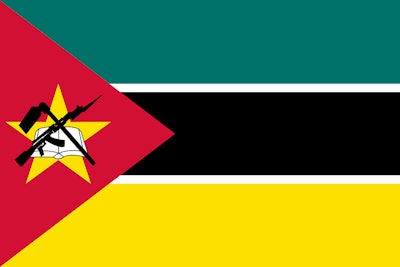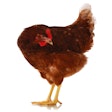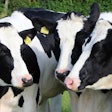
For the first time, Mozambique has detected the highly pathogenic avian influenza (HPAI) virus of the H7 group. This also represents the first such case in east Africa.
Of the more than 54,000 laying hens at a farm in the east of the country, around 15,000 showed signs of illness, and more than 8,800 died at the end of September.
According to the official notification to the World Organisation for Animal Health (WOAH), the source of infection was either legal animal movements or the introduction of new birds. Affected was a flock of hens aged 23-30 weeks kept at premises with high biosecurity.
Located in the southeastern province of Inhambane, the farm appears to be near to the Indian Ocean coast.
Based on information from the United Nations’ Food and Agriculture Organization, Mozambique was among the few countries of sub-Saharan Africa to have recorded no cases of HPAI of any type with pandemic potential since 2017.
Further H7 outbreaks in South Africa
In May of this year, the veterinary authorities detected the first cases of HPAI of the H7N6 serotype in South African poultry.
Over the following months, the number of affected poultry farms has risen to 87, according to WOAH notifications. Directly impacted have been more than eight million commercial birds.
While being located in six provinces — Gauteng, Free State, KwaZulu-Natal, Limpopo, Mpumalanga, and North West — the great majority of the outbreaks have occurred as a cluster over a relatively small area.
Covered by the latest notifications are 37 outbreaks that started between mid-August and early October. They involved individual flocks of between 130 and more than 404,000 birds of unspecified poultry type.
In early September, a first outbreak linked to the same virus serotype was detected in a backyard poultry flock, the animal health agency reported to WOAH. Affected was a group of 16 birds in Johannesburg.
For the first time, presence of the H7N6 virus was detected in the province of Western Cape.
According to Times Live, the outbreak was confirmed last week in poultry at a farm in the city of George in the Garden Route district.
A local official reported that the birds had recently been brought to the farm from another province. All of the remaining birds at the premises had been culled and so far, no further outbreaks have been confirmed in the district.
Western Cape farmers are warned by another official to use extreme caution if they bring in poultry from other provinces. Furthermore, they need to carry out frequent cleaning and disinfection around their premises, and not allow any non-essential visitors to enter their farm.
New outbreaks linked to H5 HPAI in poultry
Since April of this year, South Africa’s poultry sector has also been continuing to battle an HPAI virus of the H5 family.
Most recently confirmed to WOAH have been three outbreaks starting between August 21 and September 19. Affected were 740 birds in Mpumalanga, 3,500 in Western Cape, and 84,500 in KwaZulu-Natal.
These bring the total number of poultry directly impacted by the H5 virus in the country so far to more than 1.75 million.
As well as these cases in commercial birds, South Africa’s animal health agency has also confirmed to WOAH that the H5 virus was detected in a backyard flock in the city of Cape Town in early September.
Ongoing disruption to South Africa's poultry supply chains
Together, the two virus serotypes have directly impacted 10 million of the country’s poultry over the past six months, disrupting South Africa’s poultry supply chains.
Already at the start of this month, shortages of eggs and chicken were occurring at retail outlets.
At the time, the government agriculture department DALRRD reported that Minister Thoko Didiza had met with representatives of both the poultry and retail sectors to discuss the impacts of HPAI, and how to ensure adequate supplies for South African citizens.
With the immediate impacts on the egg sector, the minister undertook to ease the procedure for issuing import permits. Together with the trade minister, Didiza was said to be considering the use of instruments to ease the supply challenges also for chicken meat.
Furthermore, the agriculture ministry was reported to be considering the medium- to long-term prospect of vaccination as a means of disease control for poultry farms.
According to the latest government release, the majority of South Africa’s independent chicken and egg producers are unaffected by HPAI.
However, the Minister of the Presidency described the HPAI as having “severe” effects on both the poultry sector and the national economy, reported SA News. The minster stressed that there is little risk of the transmission of either of the virus strains currently circulating in the country to the general public.
Another impact of HPAI has been on exports of South African poultry.
Already at the end of September, Namibia imposed a suspension on imports of South African chickens, reported Africa News.
Earlier this week, Bloomberg reported that Lesotho has also now temporarily halted the trade.
View our continuing coverage of the global avian influenza situation.
















